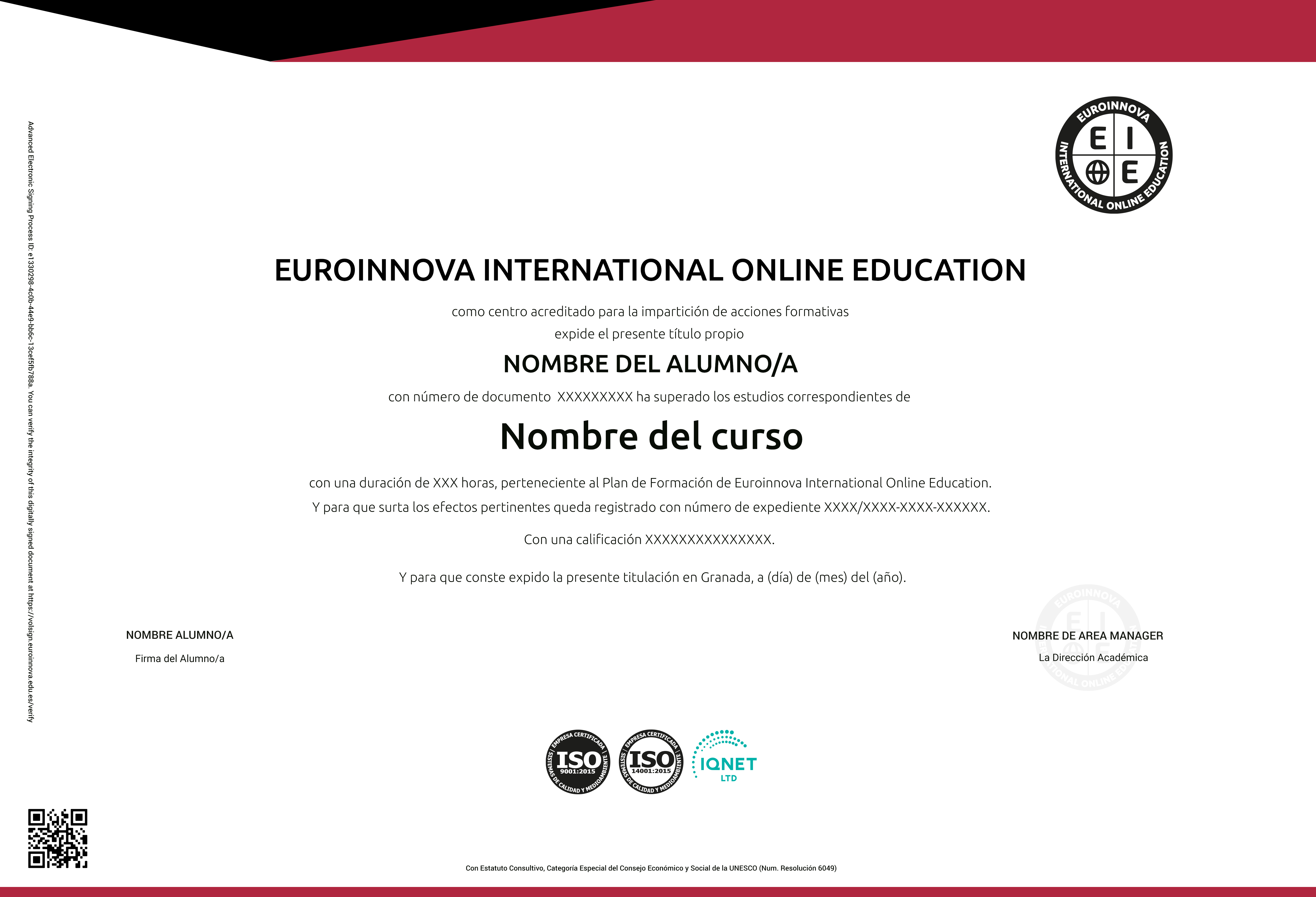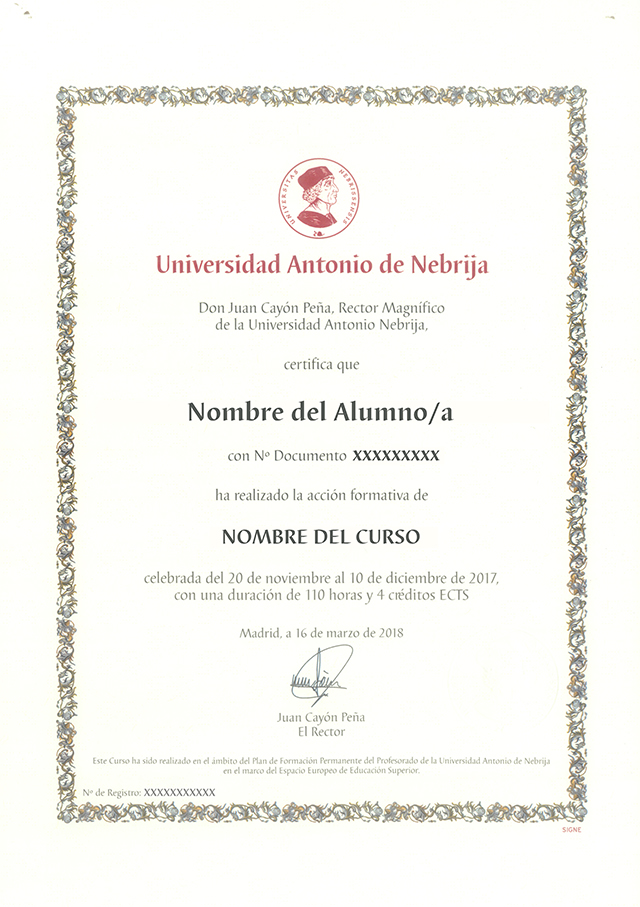Specialist course in new challenges in educational technology + Didactic application of ICT in classrooms (double degree with 5 ECTS credits)

Request information


Temario
Descargar temario en PDFPlan de estudios
Summary
This course of specialist in new challenges in educational technology + Didactic application of ICT in classrooms (double degree + 5 ECTS credits) offers basic training on the principles of the application, integration and selection of technological means available for teaching-learning processes. Thus, with this course of specialist in new challenges in educational technology + Didactic application of ICT in classrooms (double degree + 5 ECTS credits) it is intended to analyze the main technologies that can be applied in educational practice and the new resources available to implement in the educational context. The inclusion of ICT in classrooms is an imperative for all schools and constitutes a challenge for all and all teachers both at the pedagogical and management level. However, it also implies a great opportunity not only because it is a powerful didactic tool, but also for its potential to build new forms of communication and relationship between students and a new perspective of inclusion and equality in the classroom.
Goals
Professional exits
To prepare you
This course of specialist in new challenges in educational technology + Didactic application of ICT in classrooms (double degree + 5 ECTS credits) offers basic training on the principles of the application, integration and selection of technological means available for teaching-learning processes. Thus, with this course of specialist in new challenges in educational technology + Didactic application of ICT in classrooms (double degree + 5 ECTS credits) it is intended to analyze the main technologies that can be applied in educational practice and the new resources available to implement in the educational context. The inclusion of ICT in classrooms is an imperative for all schools and constitutes a challenge for all and all teachers both at the pedagogical and management level. However, it also implies a great opportunity not only because it is a powerful didactic tool, but also for its potential to build new forms of communication and relationship between students and a new perspective of inclusion and equality in the classroom.
Who is it addressed
This course of specialist in new challenges in educational technology + Didactic application of ICT in classrooms (double degree + 5 ECTS credits) is aimed at all people interested in new information and communication technologies as a new knowledge field, as well as for education professionals and educational centers that intend to incorporate into their professional practice the new tools that provide ICT.
Official character
This training is not included in the scope of official regulated training (Infant Education, Primary Education, Secondary Education, Official Professional Training FP, Baccalaureate, University Degree, Official University Master and PhD). It is therefore a complementary and/or specialization training, aimed at acquiring certain skills, skills or aptitudes of a professional nature, being able to be barely as merit in workbags and/or opposition competitions, always within the complementary training section and/or continuous training being always essential to review the specific requirements of the public labor stock of the public labor stock market.

Our methodology combines technology, pedagogy and empathy for a tailored learning.
You mark the rhythm, you decide the way and an artificial intelligence accompanies you to learn better, with meaning and purpose.

Realized personalized learning
Your style, interest and level define the route. You are the starting point.

Constructivism in action
Explore, experience and apply. Learning means understanding, not memorizing.

He who accompanies you, not who directs you
Phia, our artificial intelligence assistant guides you without limiting your autonomy.

Evaluation without pressure
Continuous and adaptive feedback. Because learning is a process, not a figure.
Certificación



Double degree: - Degree of course in new challenges in educational technology issued by Euroinnova International Online Education, member of the AEEN (Spanish Association of Business Schools) and recognized with the academic excellence in online education by QS World University Rankings - University Degree in Didactic Application of ICT in classrooms by the Antonio de Nebrija University with 5 ECTS university credits. Scoring course as merits for access oppositions to the teaching public function in all CC. AA., According to R.D. 276/2007 of February 23 (BOE 2/3/2007). This is carried out within the permanent training plan of the Antonio de Nebrija University


EDUCAHUB Scholarships
Make your most accessible training: Finish 0% interest and get personalized scholarships.
In Eduahub we believe that education must be available to everyone. Therefore, we offer a scholarship plan that facilitates your access to practical, current and quality training, eliminating economic barriers.
-25%
Alumni Scholarship: For former students of Eduahub.
-20%
Unemployment scholarship: if you prove to be unemployed.
-20%
Numerous family scholarship: for families with 3 or more children.
-20%
Disability scholarship: For people with disabilities ≥33%.
-15%
Emprende Scholarship: For self -employed that accredit your activity.
-15%
Scholarship recommends: If you come recommended by an alumnus.
-15%
Group scholarship: For joint inscriptions of 3 or more people.

An entire educational universe, on a single platform.
An intuitive environment that guides you to form autonomously and with purpose.

Learn at your pace
Courses, masters and official degrees. 100% online, flexible and at your pace.

Access from anywhere
Available 24/7 on mobile, tablet or PC. You decide when and how to train.

Phia, your mentor ia
It challenges you, motivates you and customizes your path. Learn with a guide that evolves with you.

LX One Plus: Without limit formation
Unlock soft skills, languages and more. Advances towards integral and continuous formation.



